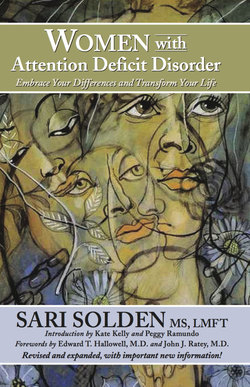Читать книгу Women With Attention Deficit Disorder: Embrace Your Differences and Transform Your Life - Sari Boone's Solden - Страница 5
На сайте Литреса книга снята с продажи.
INTRODUCTION TO THE NEW EDITION by Peggy Ramundo and Kate Kelly
ОглавлениеA decade ago, we were happily writing the introduction for Sari’s groundbreaking book, Women with Attention Deficit Disorder. The subtitle, Embracing Disorganization at Home and in the Workplace, was a topic near and dear to Peggy’s heart, as she could be the poster child for the society for chronic disorganization. Kate, on the other hand, was organized, but at great cost. She simply limited her life severely, so that she was never caught in disarray, disorder or failing to meet a deadline. Kate also had a host of somatic symptoms that would give her an honored place in the hypochondriacs hall of fame. These ailments were the result of stuffing down the angst of trying too hard to keep it all together.
Today, ten years later, we are confronting the organizational demon again. It is the eleventh hour and the partially completed new and improved introduction to Sari’s book is nowhere to be found. Not on our hard drives, in multiple email boxes or in the many piles we have sifted through in the search for this treasure. In the past, before we read Sari’s book and began the process of de-toxing those crippling layers of shame, it might have been time to get out the cyanide, or tar and feathers or something like that.
So, after all the years of ADD recovery work, we are back at groundzero. All the systems in the world couldn’t save us from this last minute scramble. The same old-same old, but with one important difference—we are laughing. Joking our way through the process of letting go of the misplaced text, and starting over. But first, giving ourselves a virtual hug infused with a liberal dose of acceptance and approval.
We have been ADD coaches for the past ten years, our clients mostly women. Almost without exception, these women talk about the book (Women with ADD) that “saved my life.” They are not kidding, and they are not being hyperbolic. They weep as they describe their profound sense of relief upon reading the book and finding that they are not alone; that there are sisters out there who are similarly oppressed by mountains of “stuff,” both physical and psychological.
Perhaps the most important contribution Sari made, was to honor the heroic struggle of ADDult women, who are trying to keep themselves and everyone else in the family together while handicapped by weak attentional skills. One of the most devastating experiences for women with ADD is feeling you are drowning in a sea of trivia that everybody else can manage with their hands tied behind their backs. We women with ADD then feel not only that we are inadequate, but also that we are just whining about really silly stuff.
Here are some of the comments our clients have made:
“Did Sari install a nanny cam in my kitchen? How does she know so much about my life?”
“I never realized that being a homemaker was such a difficult job when you have ADD - I just thought that I was a complete loser.”
“I was able to schedule my first coaching session after reading Sari’s book. Before that I was too embarrassed and ashamed to talk to anyone about the reality of my life.”
In the years since the first adult ADD book appeared on the horizon, there has been a whole host of excellent books written that offer a glimpse into the ADD mind and the ADD experience.
None, however, has touched our hearts in the way that Sari did, when she laid bare her emotional experience and those of her clients in Women with Attention Deficit Disorder. Before Sari’s book came out, women with ADD were an invisible population. No one was talking about the possibility that the female form of the disorder presented very differently from the mostly male subjects profiled in the literature. The book inspired others to write about and begin researching the issues of women and girls with ADD.
In this second edition of Women with Attention Deficit Disorder, you will find new, up-to-date information on medication and how to make decisions re: medical treatment. A special section on friendship challenges will help you, the reader, find ways to take down the walls of isolation and connect authentically with others. We are certain that you will appreciate the wealth of new information on how hormones play a critical role in the female ADD experience.
If you are a new reader, you have a big treat in store for you. If you are a loyal fan of Sari’s work, you will be delighted with the new material that will add another dimension to your understanding of how ADD plays a role in your life. It may be time to give the book a second read in any case. Or a third, fourth . . . twentieth, etc.. Rereading a pivotal book like this one after more growth and life experience can lead to fresh insights. Give yourself, once again, the gift of healing laughter and tears. We did.
Warmly,
Kate Kelly and Peggy Ramundo
